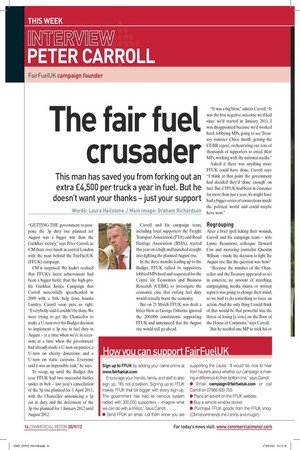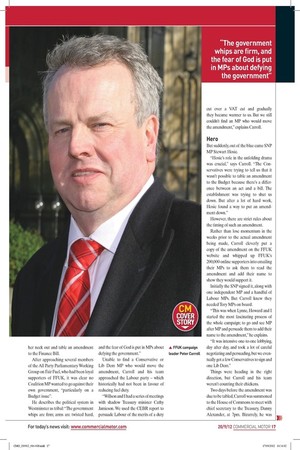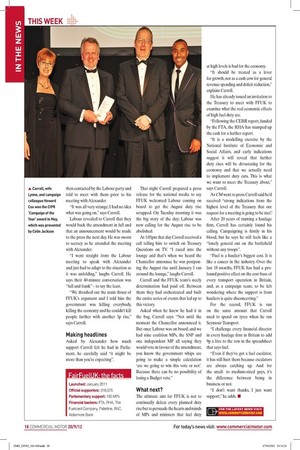PETER CARROLL
Page 12

Page 13

Page 14

If you've noticed an error in this article please click here to report it so we can fix it.
FairFuelUK campaign founder
The fair fuel crusader
This man has saved you from forking out an extra £4,500 per truck a year in fuel. But he doesn’t want your thanks – just your support
Words: Laura Hailstone / Main image: Graham Richardson
“GETTING THE government to postpone the 3p duty rise planned for August was a bigger win than the Gurkhas’ victory,” says Peter Carroll, as CM chats over lunch in central London with the man behind the FairFuelUK (FFUK) campaign.
CM is surprised. We hadn’t realised that FFUK’s latest achievement had been a bigger battle than the high-proile Gurkhas Justice Campaign that Carroll successfully spearheaded in 2009 with a little help from Joanna Lumley. Carroll soon puts us right. “Everybody said it couldn’t be done. We were trying to get the Chancellor to make a U-turn over his Budget decision to implement a 3p rise in fuel duty in August – at a time when we’re in recession; at a time when the government had already made a U-turn on pasties; a U-turn on charity donations; and a U-turn on static caravans. Everyone said it was an impossible task,” he says.
To recap, up until the Budget this year FFUK had two successful battles under its belt – last year’s cancellation of the 5p rise planned for 1 April 2011, with the Chancellor announcing a 1p cut in duty, and the deferment of the 3p rise planned for 1 January 2012 until August 2012. Carroll and his campaign team, including loyal supporters the Freight Transport Association (FTA) and Road Haulage Association (RHA), started this year on a high and launched straight into ighting the planned August rise.
In the three months leading up to the Budget, FFUK rallied its supporters, lobbied MPs hard and requested for the Centre for Economics and Business Research (CEBR) to investigate the economic case that cutting fuel duty would actually boost the economy.
But on 21 March FFUK was dealt a bitter blow as George Osborne ignored the 200,000 constituents supporting FFUK and announced that the August rise would still go ahead. “It was a big blow,” admits Carroll. “It was the irst negative outcome we’d had since we’d started in January 2011. I was disappointed because we’d worked hard, lobbying MPs, going to see Treasury minister Chloe Smith, getting the CEBR report, orchestrating our tens of thousands of supporters to email their MPs, working with the national media.” Asked if there was anything more FFUK could have done, Carroll says: “I think at that point the government had decided they’d ‘done enough’ on fuel. But if FFUK had been in existence for more than just a year, we might have had a bigger series of connections inside the political world and could maybe have won.”
Regrouping
After a brief spell licking their wounds, Carroll and his campaign team – wife Lynne Beaumont, colleague Howard Cox and motoring journalist Quentin Willson – made the decision to ight the August rise. But the question was: how?
“Because the mindset of the Chancellor and the Treasury appeared so set in concrete, no amount of marching, campaigning, media stunts, or written reports was going to change their mind, so we had to do something to force an action. And the only thing I could think of that would be that powerful was the threat of losing [a vote] on the loor of the House of Commons,” says Carroll.
But he needed one MP to stick his or her neck out and table an amendment to the Finance Bill.
After approaching several members of the All Party Parliamentary Working Group on Fair Fuel, who had been loyal supporters of FFUK, it was clear no Coalition MP wanted to go against their own government, “particularly on a Budget issue” .
He describes the political system in Westminster as tribal: “The government whips are irm; arms are twisted hard, and the fear of God is put in MPs about defying the government.” Unable to ind a Conservative or Lib Dem MP who would move the amendment, Carroll and his team approached the Labour party – which historically had not been in favour of reducing fuel duty.
“Willson and I had a series of meetings with shadow Treasury minister Cathy Jamieson. We used the CEBR report to persuade Labour of the merits of a duty cut over a VAT cut and gradually they became warmer to us. But we still couldn’t ind an MP who would move the amendment,” explains Carroll.
Hero
But suddenly, out of the blue came SNP MP Stewart Hosie.
“Hosie’s role in the unfolding drama was crucial,” says Carroll. “The Conservatives were trying to tell us that it wasn’t possible to table an amendment to the Budget because there’s a difference between an act and a bill. The establishment was trying to shut us down. But after a lot of hard work, Hosie found a way to put an amendment down.” However, there are strict rules about the timing of such an amendment.
Rather than lose momentum in the weeks prior to the actual amendment being made, Carroll cleverly put a copy of the amendment on the FFUK website and whipped up FFUK’s 200,000 online supporters into emailing their MPs to ask them to read the amendment and add their name to show they would support it.
Initially the SNP signed it, along with one independent MP and a handful of Labour MPs. But Carroll knew they needed Tory MPs on board.
“This was when Lynne, Howard and I started the most fascinating process of the whole campaign; to go and see MP after MP and persuade them to add their name to the amendment,” he explains.
“It was intensive one-to-one lobbying, day after day, and took a lot of careful negotiating and persuading, but we eventually got a few Conservatives to sign and one Lib Dem.” Things were heading in the right direction, but Carroll and his team weren’t counting their chickens.
Two days before the amendment was due to be tabled, Carroll was summoned to the House of Commons to meet with chief secretary to the Treasury, Danny Alexander, at 7pm. Bizarrely, he was then contacted by the Labour party and told to meet with them prior to his meeting with Alexander.
“It was all very strange; I had no idea what was going on,” says Carroll.
Labour revealed to Carroll that they would back the amendment in full and that an announcement would be made to the press the next day. He was sworn to secrecy as he attended the meeting with Alexander.
“I went straight from the Labour meeting to speak with Alexander and just had to adapt to the situation as it was unfolding,” laughs Carroll. He says their 40-minute conversation was “full and frank” – to say the least.
“We thrashed out the main thrust of FFUK’s argument and I told him the government was killing everybody, killing the economy and he couldn’t kill people further with another 3p rise,” says Carroll.
Making headlines
Asked by Alexander how much support Carroll felt he had in Parliament, he carefully said “it might be more than you’re expecting” . That night Carroll prepared a press release for the national media to say FFUK welcomed Labour coming on board to get the August duty rise scrapped. On Tuesday morning it was the big story of the day; Labour was now calling for the August rise to be abolished.
At 1.05pm that day Carroll received a call telling him to switch on Treasury Questions on TV. “I raced into the lounge and that’s when we heard the Chancellor announce he was postponing the August rise until January. I ran around the lounge,” laughs Carroll.
Carroll and the FFUK team’s steely determination had paid off. Between them they had orchestrated and built the entire series of events that led up to this victory.
Asked when he knew he had it in the bag, Carroll says: “Not until the moment the Chancellor announced it. But once Labour was on board, and we had nine coalition MPs, the SNP and one independent MP all saying they would vote in favour of the amendment, you know the government whips are going to make a simple calculation ‘are we going to win this vote or not’ . Because there can be no possibility of losing a Budget vote.”
What next?
The ultimate aim for FFUK is not to continually defeat every planned duty rise but to persuade the hearts and minds of MPs and ministers that fuel duty at high levels is bad for the economy.
“It should be treated as a lever for growth, not as a cash cow for general revenue spending and deicit reduction,” explains Carroll.
He has already issued an invitation to the Treasury to meet with FFUK to examine what the real economic effects of high fuel duty are.
“Following the CEBR report, funded by the FTA, the RHA has stumped up the cash for a further report.
“It is a modelling exercise by the National Institute of Economic and Social Affairs, and early indications suggest it will reveal that further duty rises will be devastating for the economy and that we actually need to implement duty cuts. This is what we want to meet the Treasury about,” says Carroll.
As CM went to press Carroll said he’d received “strong indications from the highest level of the Treasury that our request for a meeting is going to be met”.
After 20 years of running a haulage irm, Carroll has certainly found his calling. Campaigning is irmly in his blood, but he says he still feels like a “lonely general out on the battleield without any troops” .
“Fuel is a haulier’s biggest cost. It is like a cancer in the industry. Over the last 18 months, FFUK has had a profound positive effect on the cost-base of every transport operation in Britain, and, as a campaign team, to be left wondering where the support is from hauliers is quite disconcerting.” For the record, FFUK is run on the same amount that Carroll used to spend on tyres when he ran Seymour Transport.
“I challenge every inancial director in every haulage irm in Britain to add 9p a litre to the row in the spreadsheet that says fuel.
“Even if they’ve got a fuel escalator, it has still hurt them because escalators are always catching up. And for the smallto medium-sized guys, it’s the difference between being in business or not.
“I don’t want thanks, I just want support,” he adds. n
FairFueLUK: the facts
Launched: January 2011
Ofワcial supporters: 316,575 Parliamentary support: 150 MPs Financial backers: FTA, RHA, The Fuelcard Company, Palletline, RAC, Aldermore Bank













































